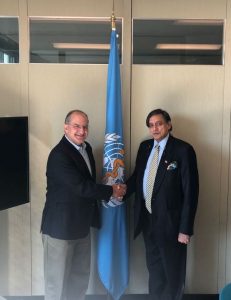Kerala Floods: Dr. Tharoor informally talks Risk, Rehabilitation and Rebuilding at UN
Even as the Indian Government is likely to politely refuse foreign aid, the Congress MP emphasises on the need for multi-sectoral assistance from UN agencies for prevention of diseases and holding an international reconstruction conference to rebuild Kerala.
 Even as the flood situation recedes in Kerala, “risk of diseases, rehabilitation and rebuilding” are major concerns that need to be addressed at the earliest, stated Thiruvananthapuram MP Dr. Shashi Tharoor, who undertook a series of high-level discussions in Geneva with the senior leadership of the World Health Organization, the United Nations, and the International Red Cross to brief them on the devastating humanitarian crisis and explore possibilities of assistance.
Even as the flood situation recedes in Kerala, “risk of diseases, rehabilitation and rebuilding” are major concerns that need to be addressed at the earliest, stated Thiruvananthapuram MP Dr. Shashi Tharoor, who undertook a series of high-level discussions in Geneva with the senior leadership of the World Health Organization, the United Nations, and the International Red Cross to brief them on the devastating humanitarian crisis and explore possibilities of assistance.
Dr. Tharoor, who is a former UN Under-Secretary-General with 29 years of experience in the organisation, said in a statement that he had consulted “personally and directly” with Kerala Chief Minister Pinarayi Vijayan “on the utility of these discussions, their nature and purport and the specific areas of priority for the Chief Minister”.
“This reach was primarily due to a moral responsibility he felt as a Keralite to explore possibilities of international assistance and support to alleviate the sufferings of fellow Keralites, and place these recommendations before the state government for its consideration, and pursuance, if found necessary, with the central government,” the statement read.
Travelling on an individual capacity, Dr. Tharoor, who is also the Chairman of the Parliamentary Standing Committee on External Affairs, mentioned that the purpose of these meetings was to “understand and identify avenues” through which the United Nations and the Red Cross may be able to bolster and supplement ground operations.
 Major pointers highlighted in the two-day engagement as on August 20 and 21, are that the State Government should request for two million WHO stock of anti-cholera vaccines to minimise the risk of grave water-borne diseases; the Government of Kerala should examine whether it requires a Multi-sectoral needs assessment by UN agencies (WHO, UNICEF, OCHA) and the State Government should accept Gujarat University Forensics support for dead body management. The minutes of the meetings with Indian Permanent Representative to the United Nations in Geneva, Ambassador Rajiv Chander, also stated that depending on whether the quantum of long-term reconstruction assistance from the Central Government is adequate, the State Government should give thought to holding an international reconstruction conference to `Rebuild Kerala better` in partnership with the UN system.
Major pointers highlighted in the two-day engagement as on August 20 and 21, are that the State Government should request for two million WHO stock of anti-cholera vaccines to minimise the risk of grave water-borne diseases; the Government of Kerala should examine whether it requires a Multi-sectoral needs assessment by UN agencies (WHO, UNICEF, OCHA) and the State Government should accept Gujarat University Forensics support for dead body management. The minutes of the meetings with Indian Permanent Representative to the United Nations in Geneva, Ambassador Rajiv Chander, also stated that depending on whether the quantum of long-term reconstruction assistance from the Central Government is adequate, the State Government should give thought to holding an international reconstruction conference to `Rebuild Kerala better` in partnership with the UN system.
“It was stated that he stressed throughout that his discussions were “informal and exploratory” and that whether UN assistance was needed would be determined by the two Governments, State and Centre.”
Recall that Kerala Chief Minister Pinarayi Vijayan sought Rs 2,600 crore assistance from the Centre for relief and rehabilitation work, and announced today that Sheikh Mohammed bin Rashid Al Maktoum, United Arab Emirates’ Prime Minister offered Rs 700 crore towards the cause. Qatar and Maldives have also offered to help with Rs 35 Crore and $50,000 respectively. However, the Centre is likely to turn down government foreign aid as it has in the past including the Kashmir Floods in 2014 and Uttarakhand floods in 2013.
“It is to be seen what the Government of India decides in the matter as until a formal request for aid is generated, flood-ravaged Kerala will not be able to receive any foreign government aid.”
In the discussions with the UN Ambassador, it has been stated by Dr. Tharoor that since the Government of India does not wish to request international assistance directly, “it is entirely feasible to operationalise any of the earlier recommendations by negotiating with the UN system to have the UN offer what we need, on a no-objection basis from the Government of India.”
